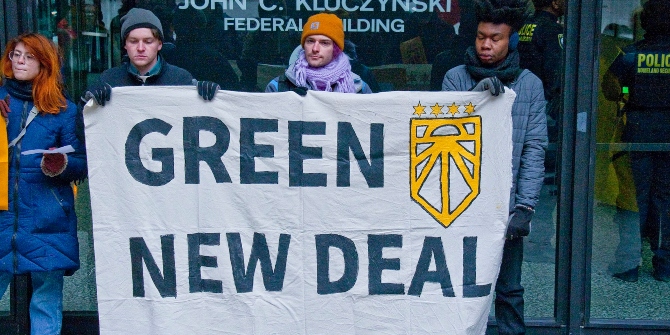The World Bank has spent decades shielding multinational companies from political risks in emerging markets. Jonas Gamso writes that the bank should now direct equal attention to the risks being generated by climate change.
Among the ingredients that help poor countries become richer, few are more important than foreign direct investment. Investment creates jobs and brings in new technologies that help countries move up the value chain. Yet foreign investors are risk averse, often leading them to avoid the developing countries that stand to benefit the most from investment inflows. Recognising this problem, the World Bank, the world’s premier development organisation, has sought to shield companies from political risks through its provision of political risk insurance and its investor-state arbitration system. These efforts encourage companies to invest in countries that they might otherwise avoid. The Bank has traditionally prioritised political risks, but the time has come for it to give comparable attention to the risks related to climate change.
Climate risks are impacting every region of the world and hitting the poorest countries hardest. Weather and climate disasters have grown in frequency and severity, with over twenty billion-dollar disaster events occurring in 2020, generating over $300 billion in costs. In 2022, global warming contributed to catastrophic flooding in Pakistan that submerged approximately one-third of the country and displaced over 30 million people. Cautiousness is growing among multinational companies, and climate risks are now discouraging investment in emerging markets, particularly those not well positioned to adapt to climate change. Investor avoidance will worsen as climate-related disruptions multiply and as multinational companies become savvier about climate change and its impacts.
The World Bank is seasoned at helping companies mitigate political risks, and is well positioned to expand its operations to address the risks brought about by climate change. It can do so in three ways: (1) Expanding its risk insurance offerings to cover disasters exacerbated by climate change, (2) ensuring that its investor-state arbitration mechanism does not punish governments for implementing strict environmental policies designed to increase adaptive capacity, and (3) prioritising loans and grants that shore up climate adaptation efforts in developing countries.
The first step that the World Bank can take is to expand the menu of noncommercial risk insurance guarantees it provides to include insurance against climate risks. These guarantees currently cover various political risk incidents, such as the outbreak of civil war or expropriation by the host government. Guarantees against climate risks should be made available as well to give foreign investors confidence that all will not be lost if a catastrophe attributable to, or exacerbated by, climate change occurs. A concern is that it can be difficult to identify climate change as the culprit to any individual weather incident, but the science in this area is improving (scientists conducted attribution studies to quickly determine that Pakistan’s flooding was aggravated by climate change) and will become still more precise in the coming years. Insurance should be awarded for environmentally friendly investments as well and, indeed, this is already a priority for the Bank.
A second step for the World Bank is to reform its investor-state arbitration court to ensure that governments are not punished for enacting environmentally friendly policies. These proceedings are intended to give foreign investors a nonbiased forum to sue host governments that treat them unfairly, but one of the major criticisms of the World Bank’s court is that individual investors can sue host governments for establishing pro-environmental policies that threaten their returns. For example, in 2012, Ecuador was fined $1.8 billion for cancelling a contract with Occidental Petroleum for oil exploration. In a world of climate risks, the World Bank should not be undermining policies designed to address climate change, as doing so may exacerbate risks and make countries less attractive to foreign investors in the future.
The third step that the World Bank should take is to prioritise funding that helps governments adapt their countries to climate change. Adaptation costs are among the factors that deter companies from investing in markets where climate risk is a concern, but that deterrent effect is less pronounced when the host country has adaptation mechanisms in place. However, financing gaps have often prevented the adoption of tools to manage climate change. The World Bank specialises in development-oriented financing, including for projects related to sustainability, so it is well positioned to provide funding to help governments adapt to and, where possible, mitigate climate change. This would reduce the adaptation costs for companies, thereby increasing their likelihood to invest.
Foreign investment is crucial to fostering economic growth and development in poor nations. Yet multinational corporations are likely to turn away from those very countries as climate risks grow. Using the strategies above, the World Bank can help to keep foreign investment flowing to the countries that need it most.
♣♣♣
Notes:
- This blog post represents the views of its author(s), not the position of LSE Business Review or the London School of Economics.
- Featured image by Zac Durant on Unsplash
- When you leave a comment, you’re agreeing to our Comment Policy.






How can the World Bank ensure that its efforts to address climate risks in developing countries do not unintentionally exacerbate existing inequalities or exploit vulnerable populations?